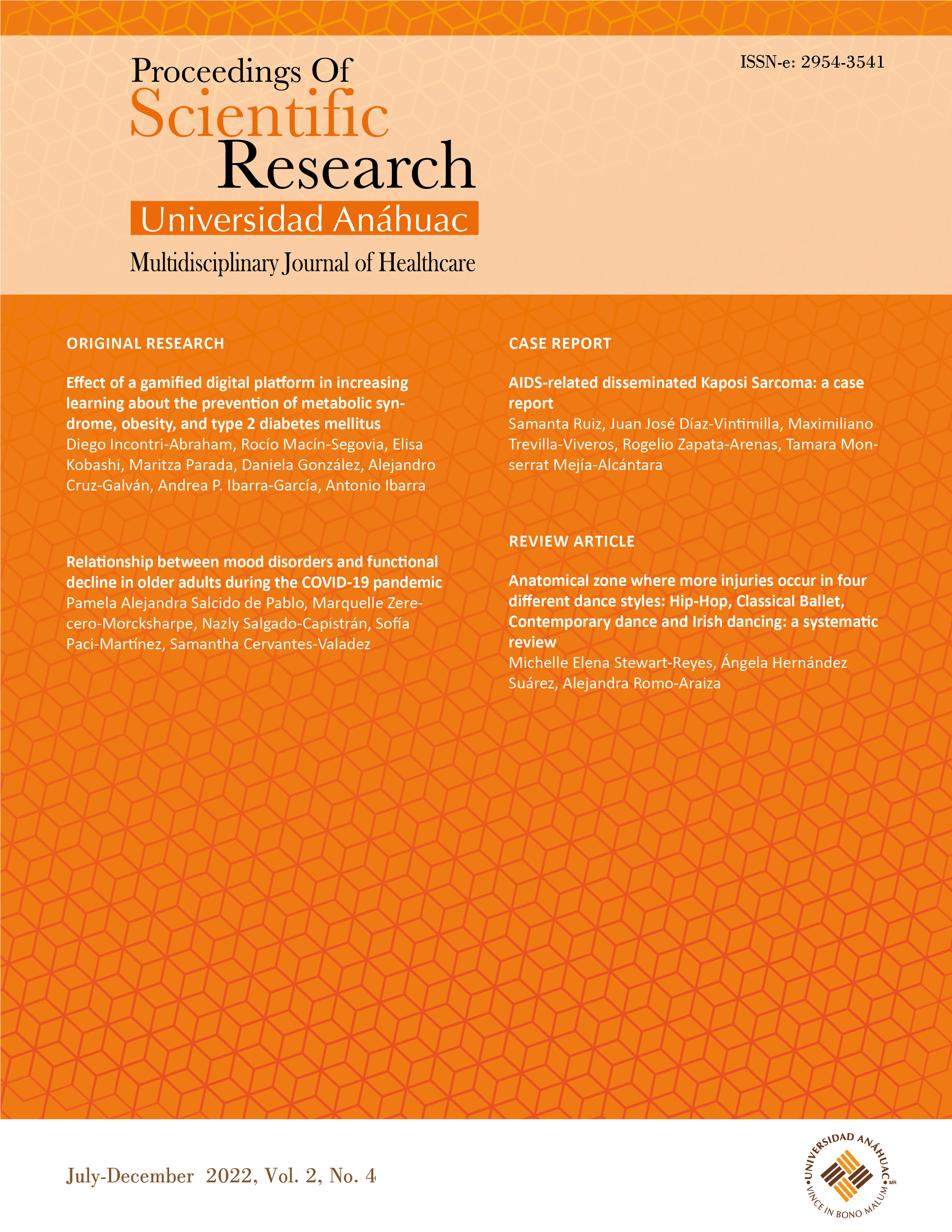Relationship between mood disorders and functional decline in older adults during the COVID-19 pandemic
DOI:
https://doi.org/10.36105/psrua.2022v2n4.02Keywords:
older persons, depression, anxiety, functional decline, pandemicAbstract
Introduction: During the COVID-19 pandemic, isolation and reduction in mobility have increased the rate of depression and anxiety. This paper reviews the incidence of mood disorders and functional decline in older adults during this period. Methods: We used the Geriatric Depression Scale, the Goldberg anxiety Scale, the Lawton and Brody, and Katz scales to draw our conclusions. Results: A total of 237 patients were clinically evaluated, being 163 women and 74 men. Of the 163 women in the study, 117 suffered from anxiety and 122 from depression. Also, 75 women out of the 163 included in the study, had COVID-19. Of the 74 men evaluated, 35 presented symptoms of anxiety and 27 of depression, the group age that presented the most anxiety were adults between 60 and 69 years old, and depression between 80 and 89 years old. Of these men, 22 had COVID-19. Conclusion: Confinement during the COVID-19 pandemic has increased depression and anxiety levels in older adults, which in turn has had significant impact on their mental health.
Downloads
PLUMX metrics
References
Vahia IV, Jeste DV, Reynolds CF 3rd. Older adults and the mental health effects of COVID-19. JAMA [Internet]. 2020;324(22):2253-4. Available from: http://doi.org/10.1001/jama.2020.21753
Lakhan R, Agrawal A, Sharma M. Prevalence of depression, anxiety, and stress during COVID-19 pandemic. J Neurosci Rural Pract [Internet]. 2020;11(4):519-25. Available from: http://doi.org/10.1055/s-0040-1716442
Hwang T-J, Rabheru K, Peisah C, Reichman W, Ikeda M. Loneliness and social isolation during the COVID-19 pandemic. Int Psychogeriatr [Internet]. 2020;32(10):1217-20. Available from: http://doi.org/10.1017/S1041610220000988
Cunningham C, O’ Sullivan R. Why physical activity matters for older adults in a time of pandemic. Eur Rev Aging Phys Act [Internet]. 2020;17(1):16. Available from: http://doi.org/10.1186/s11556-020-00249-3
Mackolil J, Mackolil J. Why is mental health of the geriatric population at a higher risk during the COVID-19 pandemic? Asian J Psychiatr [Internet]. 2020;54(102401):102401. Available from: http://doi.org/10.1016/j.ajp.2020.102401
Mackolil J, Mackolil J. Addressing psychosocial problems associated with the COVID-19 lockdown. Asian J Psychiatr [Internet]. 2020;51(102156):102156. Available from: http://doi.org/10.1016/j.ajp.2020.102156
Wilson RS, Krueger KR, Arnold SE, Schneider JA, Kelly JF, Barnes LL, et al. Loneliness and risk of Alzheimer disease. Arch Gen Psychiatry [Internet]. 2007;64(2):234-40. Available from: http://doi.org/10.1001/archpsyc.64.2.234
Casey DA. Depression in older adults: A treatable medical condition. Prim Care [Internet]. 2017;44(3):499-510. Available from: http://doi.org/10.1016/j.pop.2017.04.00
Kok RM, Reynolds CF III. Management of depression in older adults: A review. JAMA [Internet]. 2017;317(20):2114. Available from: http://doi.org/10.1001/jama.2017.5706
Zhang J, Yang Z, Wang X, et al. The Relationship Between Resilience, Anxiety, and Depression Among Patients with Mild Symptoms of COVID-19 in China: A Cross-Sectional Study. J Clin Nurs 2020;29(21-22):4020-29.
Sachs-Ericsson N, Selby E, Corsentino E, Collins N, Sawyer K, Hames J, et al. Depressed older patients with the atypical features of interpersonal rejection sensitivity and reversed vegetative symptoms are similar to younger atypical patients. Am J Geriatr Psychiatry [Internet]. 2012;20(7):622-34. Available from: http://doi.org/10.1097/JGP.0b013e31822cccff
Park JH, Moon JH, Kim HJ, Kong MH, Oh YH. Sedentary lifestyle: Overview of updated evidence of potential health risks. Korean J Fam Med [Internet]. 2020;41(6):365-73. Available from: http://doi.org/10.4082/kjfm.20.0165
de Rezende LFM, Rey-López JP, Matsudo VKR, do Carmo Luiz O. Sedentary behavior and health outcomes among older adults: a systematic review. BMC Public Health [Internet]. 2014;14(1):333. Available from:
http://doi.org/10.1186/1471-2458-14-333
Consulta interactiva de datos [Internet]. Org.mx. [cited 2022 Mar 25]. Available from: https://www.inegi.org.mx/sistemas/olap/consulta/general_ver4/MDXQueryDatos.asp?
Agencia Digital de Innovación Pública. Portal de Datos Abiertos de la CDMX [Internet]. Gob.mx. [cited 2022 Mar 25]. Available from: https://datos.cdmx.gob.mx/dataset/casos-asociados-a-covid-19
Published
How to Cite
Issue
Section
License
Copyright (c) 2022 Pamela Alejandra Salcido de Pablo, Marquelle Zerecero-Morcksharpe, Nazly Salgado-Capistrán, Sofía Paci-Martínez, Samantha Cervantes-Valadez

This work is licensed under a Creative Commons Attribution-NonCommercial-NoDerivatives 4.0 International License.
All the intellectual content found in this publication is licensed to the consumer public under the figure of Creative Commons©, unless the author of said content has agreed otherwise or limited said faculty to "Proceedings of Scientific Research Universidad Anáhuac. Multidisciplinary Journal of Healthcare©" or "Universidad Anáhuac Mexico©" in writing and expressly.
Proceedings of Scientific Research Universidad Anáhuac. Multidisciplinary Journal of Healthcare is distributed under a Creative Commons Attribution-NonCommercial-NoDerivatives 4.0 International License.
The author retains the economic rights without restrictions and guarantees the journal the right to be the first publication of the work. The author is free to publish his article in any other medium, such as an institutional repository.













